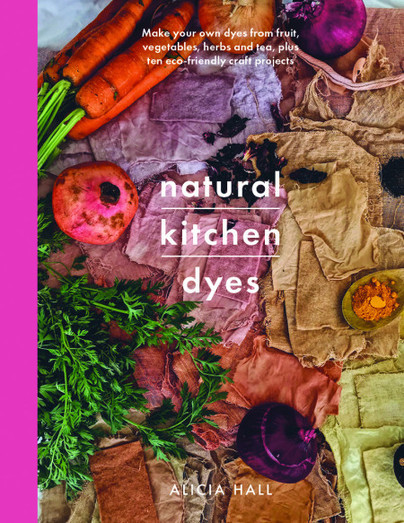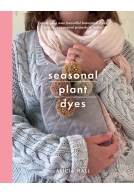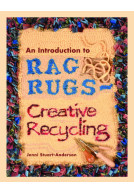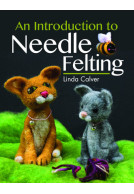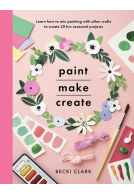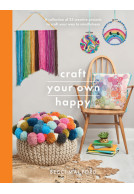Natural Kitchen Dyes (Paperback)
Make Your Own Dyes from Fruit, Vegetables, Herbs and Tea, Plus 10 Eco-Friendly Craft Projects
Imprint: White Owl
Series: Crafts
Pages: 152
Illustrations: 150 colour illustrations
ISBN: 9781526793096
Published: 2nd March 2022
(click here for international delivery rates)
Order within the next 4 hours, 9 minutes to get your order processed the next working day!
Need a currency converter? Check XE.com for live rates
| Other formats available | Price |
|---|---|
| Natural Kitchen Dyes ePub (7.7 MB) Add to Basket | £6.99 |
With Natural Kitchen Dyes you can explore the magical world of natural dyes, without the need of a garden full of dye plants. Our kitchens are a great source of natural dye colours, from vegetable peels that create blush pinks and peaches, fruit skins that make lemon yellows, a green dye sourced from carrot tops, dried spices and used tea bags to create vibrant yellows, rich terracottas and deep browns. Natural Kitchen Dyes takes you through the exciting process of creating these wonderful natural colours, dyeing fabric with the dyes and suggests ingenious ways to get your hands on some natural dye sources. Accompanying the natural dye recipes in the book are ten environmentally conscious projects, which have been created not only to show off the natural dyes beautifully, but to help eliminate waste. Several of the projects actually utilise waste that would otherwise be composted or recycled such as old clothes turned into bags and patchwork floor cushions, to dried pulses past their expiration date used to make a beaded necklace.
This is my sort of book: no need to start your adventure with a shopping expedition for ingredients - at least not to begin with – it’s all there in the kitchen for a safe, spur-of-the-moment indulgence.
The Journal for Weavers, Spinners & Dyers, issue 284 (Winter 2022)
Having studied Fashion Design, followed by working as a National Trust gardener, Alicia has been able to produce a well-informed, environmentally friendly and practical instruction book for both novice and the more experienced dyer. Beautifully illustrated with excellent photographs, Alicia begins with ideas how you can collect and store dye ingredients – at little or no cost. Her number one rule for successful natural dyeing is to use natural fibres and she explains this, and why synthetic fibres are so disappointing with natural dyes, in chapter two.
Despite using kitchen ingredients, Alicia rightly warns participants to be cautious: some of the dye materials are parts of the plant you wouldn’t normally eat and in large quantities could prove toxic. Rhubarb leaves are particularly toxic (and should be kept away from children) and there are modifiers she uses to enhance colour that will cling to saucepans and stain or taint them. Otherwise, the dyeing can be done safely in the kitchen, but do use dye-dedicated utensils only.
Chapters four and five deal respectively with the pre-treating of fabric with soya and colour chemistry of natural dyes – both essential topics to understand in order to avoid disappointment. Following on are chapters on dye basics, dye recipes, inks and printing, modifiers and dyes that are not fast but can be used safely with children.
Finally, there are ten projects to try – or just give you inspiration for some kitchen dye-magic on a rainy day.
As featured in
Sew
Rating: 5 out of 5 stars
NetGalley, Verity Ashton
Fantastic book with wonderful ideas for anyone wanting to start using natural dyes easily and at home.
As featured in
Let's Knit
Rating: 5 out of 5 stars
NetGalley, Richelle Rodarte
I loved this book the range of colors achievable is amazing. I honestly did not realize how complex the process can be but the results are definitely worth the effort. If you are interested in natural dyes this is a must have book. You won’t be disappointed it is filled with helpful hints instructions and pictures to help you achieve the colors you desire. I highly recommend this book!
Rating: 5 out of 5 stars
NetGalley, Melissa D
A great reference book for using items commonly found in the kitchen to create your own dye projects. This is a wonderful book for those at any level in the hand dyeing process.
As featured in
Simply Crochet
The illustrations are gorgeous throughout the book, making it clear what to use and making me lust after the beautifully subtle array of colours. I love the idea that I can cook a meal and use peelings, stones and leftovers to create lovely dyes later and especially the fact that as these are foodstuffs that both these raw materials and the dyes can be frozen for use at a future date.
Amazon Customer
Rating: 5 out of 5 stars
NetGalley, Justine Gomes
What a beautiful book. This recipe collection inspires me to be more crafty and environmentally conscious! I enjoyed learning about how to use natural dyes and the included projects and recipes are incredibly useful! I will be purchasing a copy of this to put on my shelf for easy reference.
A gentle and approachable introduction to making your own natural fabric dyes. Hall includes lists of suggested equipment, kitchen scraps to save, types of fabric recommended, etc. There are recipes for making various colors, with lots of gorgeous photography. Plenty of tips to help you wash, maintain, and use your hand-dyed fabrics. Good for hobbyists and medium or large public library collections.
NetGalley, Erin Gordenier
Rating: 5 out of 5 stars
NetGalley, Cathy Geha
I remember dying a long white skirt and top when living in Jordan. I didn’t know then that one needs to set the dye so it eventually faded back to white. If I had been able to refer to this book back then the skirt, now long gone, would not have faded back to white…probably.
The chapters in the book”
* Introduction
* Collecting (what and how to collect and store natural ingredients to use for dyes)
* Fabrics (natural are recommended with specifics included)
* Tools
* Soya Milk (I know…wondered about this as it is hard to find to buy locally…interesting what it is used for)
* Color Fast, Fugitive, and PH Sensitive colors
* Dye Basics
* Dye Recipes
* Ink and Printing
* Modifiers
* Other Dyes
* Gift Wrap
* Projects (12 of them)
The colors are much softer looking than the brighter ones often found in fabrics we buy in shops. I found a few that might work for me and do have a white linen shirt I could try a dye out on in the future. We will see. I believe that dying might be interesting and this book would assist if one were going to use natural dyes.
Rating: 5 out of 5 stars
NetGalley, Susie Ford
Some incredible idea’s in here, and I love the fact that they are natural (yes I know, it’s written on the cover of the book!), but lots things that I wouldn’t have thought of, or parts of a fruit or vegetable to get different results. Just find it incredible.
Hall (Seasonal Plant Dyes) digs into kitchen chemistry in this cozy guide to using plants to make dyes. She begins with advice on sourcing materials in low-cost, eco-friendly ways, such as enlisting friends to save food scraps and reaching out to local farmers. Hall then describes various fabric types (natural fibers derived from animals make for the most vibrant colors) and tools (most of which can be found in the kitchen). She shows how to color fabric with avocado skins for a peach tint, carrot tops for green, and turmeric for yellow, and there are tricks for using dyes for printing, too. Then come the projects: there’s an avocado-dyed, upcycled T-shirt bag; home-dyed patchwork jeans; and a sewn floor cushion readers can color-customize.
Publishers Weekly
Read the full review here!
A great introduction to natural dyes that covers the basic materials, ingredients and techniques to make permanent and semi-permanent natural dyes. Also includes up-cycling projects where you can repurpose old shirts, cushions and fabric.
NetGalley, Tiesha Burgess
'Natural Produce: Create beautiful tones from flowers with Alicia Hall's hand-dyed raffia basket'
Mollie Makes
As featured in
Mollie Makes - Issue 140
Rating: 5 out of 5 stars
NetGalley, Judy T
I love to craft with products of nature. This book did not disappoint and provided me with a wealth of knowledge. I look forward to using the information in this book to dye some wool roving that I have acquired.
Rating: 5 out of 5 stars
NetGalley, Markey Olson
A wonderful book that gives not only recipes for beautiful natural dyes, but outlines the basic materials, ingredients, and techniques you will need to get started in a straight-forward way, perfect for the beginner.
As featured in
The Bookseller
Rating: 5 out of 5 stars
NetGalley, Lorraine Ball
I absolutely love love love this book. The photos are amazing. I’ve always been interested in natural dyeing and this book is brilliant for the beginner, it has really clear useful text and uses ingredients that are readily available. It has some inspiring projects as well.
Rating: 5 out of 5 stars
NetGalley, Clare Etheridge
I usually get very excited to read books like this one, with promises of beautiful results made to look easy, then I will realize that it is not as easy as I thought!
Natural Kitchen Dyes however is a genuinely accessible book about dyeing fabric using all kinds of easy to get hold of ingredients. I really like how clear the instructions are as well as tips to gather your supplies, not many of us will have 20 avocado skins all at once, so Alicia advises freezing them until you have enough for a dye bath.
There is also lots of useful advice about fabrics, and the effects you can expect from each.
Using natural dyes can be a fickle beast but the descriptions, beautiful photographs and inspiring projects have got me inspired.
I can’t wait to see this book on our library shelves, I know our patrons are going to love it!
Now, who wants guacamole!?
A fantastic guide to natural dyeing!
NetGalley, Michelle Lyons
Alicia Hall has produced a brilliant resource for experienced and beginner dyers alike. The book covers everything from ingredients and where to collect them, to fabrics, tools, recipes and projects. She literally covers everything you need to know. The writing is clear and easy to read, and the photos throughout are gorgeous.
I have never used natural dyes before (I’ve only used acid dyes) but I’ve always been very interested. The colours that you get from natural dyes are so beautiful. This book has definitely inspired me to finally try it so this evening I will be dyeing yarn with onion skins! I can wait to see the results.
Rating: 5 out of 5 stars
NetGalley, Stefanie Bevins
This is such an interesting book. Alicia Hall gives so much detail and information on the entire process of dying from kitchen scraps and more. The book is organized and easy to understand.
Rating: 5 out of 5 stars
NetGalley, Lily Wood
This book is beautiful !
I am so looking forward to trying out all of the new techniques and the book really goes into thorough detail about what dyes you can use from left over waste such as avocado stones or even onion skins.
The techniques that this book teach you can be used on most textiles including yarn, which will enable you to make some absolutely fabulous yarns or fabrics
I would highly recommend this book to any fiber artist.
I have always been curious about using plants to create natural dyes. I was not aware of the science behind it, but it certainly makes sense. Alicia Hall has done due diligence and research I order to share with the public her findings. I love all the background and explanations. I could almost hear her next to me, quietly cheering me on, telling me that I too could do this. The photos are incredibly helpful, particularly as she starts discussing types of fabric and later modifiers. The projects provided at the end are a nice touch to provide a good starting place. I am excited to try this for myself soon. No special equipment is needed and helpful suggestions on where to find various plants are provided as well. I appreciate Alicia’s willingness to share her insights and experiences and I will happily recommend this others who are looking to try their own natural kitchen dyes.
NetGalley, Brandi Rawlins
Rating: 5 out of 5 stars
NetGalley, Leyla Johnson
I have been natural or Eco dyeing for years, and always love it when I find a new book of dyeing. This one is very, very good, the information is excellent and to the point - easy to read and understand. As for the photographs, they are stunning. The chapters are divided into area of -Collection, Fabric, Tools, Soya Milk Color fast & Ph Sensitivity dyes, Dye basics, Dye Recipes, Ink and Printing, Modifiers and Other Dyes. There are also some projects at the end to use the dyed fabric for.
This is a great book for both beginners and experienced dyers. Dyeing is so much fun, the results always magic, and with natural dyes very friendly to people and envioroment
I recommend this book very strongly.
Rating: 5 out of 5 stars
NetGalley, Saira Ahmad
This is a very interesting book! I've never thought about making my own natural dyes and didn't realise the wonderful colours you could get from the most mundane things such as onion skin!
There are clear instructions, plenty of photos and 'recipes', if you want to try making your own dye using food scraps/ingredients then this is the perfect book to try it!
About Alicia Hall
After discovering plant dyeing in a horticultural book while working as a gardener, Alicia drew on her education in fashion design to experiment with plant dyes and textiles, creating colourful dyes using the plants that grew in the gardens that she worked in. Since growing her passion into a thriving small business, Alicia now spends her time cooking up plant dyes and making textile products in her home studio in the heart of the Wiltshire countryside, where she lives with her husband and son.







